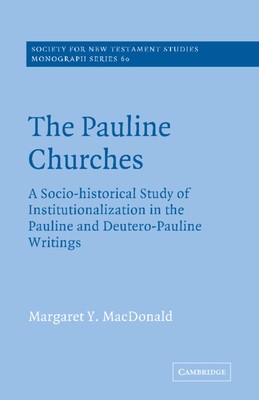
- We will send in 10–14 business days.
- Author: Margaret Y MacDonald
- Publisher: Cambridge University Press
- ISBN-10: 0521616050
- ISBN-13: 9780521616058
- Format: 14 x 21.6 x 1.7 cm, minkšti viršeliai
- Language: English
- SAVE -10% with code: EXTRA
Reviews
Description
The author studies the Pauline corpus in order to trace the process of institutionalisation in the Pauline communities. She claims that development can be traced since we have not only letters from Paul himself, but also the Pastoral epistles from the beginning of the second century, as well as Ephesians and Colossians, writings which are characteristic of the ambiguous period following the disappearance of the earliest authorities. This is the first substantial examination of the Pauline corpus from this angle; it also incorporates effectively insights from the social sciences.
EXTRA 10 % discount with code: EXTRA
The promotion ends in 21d.19:32:31
The discount code is valid when purchasing from 10 €. Discounts do not stack.
- Author: Margaret Y MacDonald
- Publisher: Cambridge University Press
- ISBN-10: 0521616050
- ISBN-13: 9780521616058
- Format: 14 x 21.6 x 1.7 cm, minkšti viršeliai
- Language: English English
The author studies the Pauline corpus in order to trace the process of institutionalisation in the Pauline communities. She claims that development can be traced since we have not only letters from Paul himself, but also the Pastoral epistles from the beginning of the second century, as well as Ephesians and Colossians, writings which are characteristic of the ambiguous period following the disappearance of the earliest authorities. This is the first substantial examination of the Pauline corpus from this angle; it also incorporates effectively insights from the social sciences.


Reviews